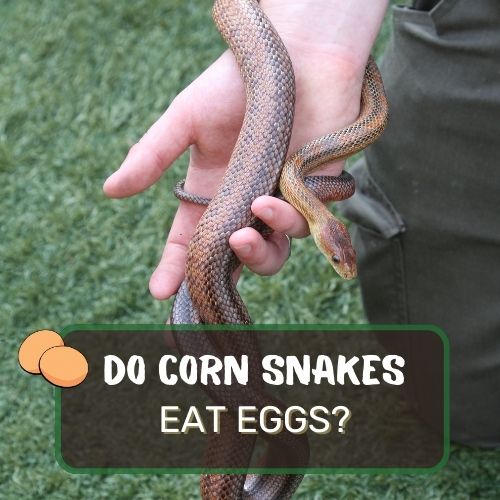
When it comes to the intriguing question, “can corn snakes eat eggs?“, many snake enthusiasts and pet owners find themselves scratching their heads.
Corn snakes, with their vibrant patterns and docile nature, are among the most popular pet reptiles.
However, understanding their dietary needs is crucial for their well-being.
In this article, we delve deep into the world of corn snake nutrition, exploring their natural diet and the potential role of eggs in it.
We’ll examine the nutritional value of eggs, weigh the benefits against the risks, and even address some frequently asked questions.
By the end, you’ll have a comprehensive understanding of whether these slithering beauties should be munching on eggs or not.
Dive in to make an informed decision for your scaly friend!
Table of Contents
- 1 Will My Corn Snake Consume Eggs?
- 2 The Natural Diet of Corn Snakes
- 3 Nutritional Value of Eggs
- 4 Types of Eggs: Which Ones Are Safe?
- 5 The Process of Feeding Eggs to Corn Snakes
- 6 Benefits of Feeding Eggs to Corn Snakes
- 7 Potential Risks and Concerns
- 8 Alternatives to Eggs in a Corn Snake’s Diet
- 9 Alright, let’s wrap this up, shall we?
- 10 FAQ
Will My Corn Snake Consume Eggs?
Corn snakes, native to North America, primarily feed on small rodents in the wild. While they have been known to occasionally consume bird eggs, it’s not a staple in their natural diet. In captivity, it’s essential to provide them with a diet that mirrors their natural eating habits, which primarily consists of mice. Feeding them chicken or quail eggs is not common practice and might not offer the balanced nutrition they require. In essence, while corn snakes can eat eggs, it’s not recommended as a regular food source for them in captivity due to potential nutritional imbalances.
The Natural Diet of Corn Snakes

Corn snakes, with their vibrant colors and docile nature, have become one of the most popular pet snakes in the world. But what do these slithering beauties munch on in the wild? Let’s dive deep into their natural menu.
What Corn Snakes Eat in the Wild
In the vast landscapes of North America, where corn snakes roam free, their primary diet consists of small rodents. Mice, young rats, and even small birds sometimes find themselves on the corn snake’s dinner plate.
- Opportunistic Hunters: Corn snakes adapt their diet based on what’s available in their environment.
- Rodent Lovers: They have a particular fondness for small rodents, especially mice and young rats.
- Juvenile Diet: In their younger days, their diet consists of softer and smaller prey such as pinkies (rodent babies), crickets and even tiny amphibians like frogs.
- Birds on the Menu: As they mature, birds, especially nestlings, can become an occasional snack.
- Habitat Influence: Corn snakes near water bodies might occasionally eat fish or amphibians while those in forested or grassland areas typically consume more rodents and birds.
- Adaptable Diet: Their varied diet showcases their resilience and versatility in different habitats in the wild.
These snakes have evolved to be expert hunters, using their keen senses to track down and constrict their prey.
How Their Diet Varies Based on Their Habitat and Age
Younger corn snakes, often referred to as hatchlings or juveniles, tend to feast on smaller prey like insects and tiny amphibians. As they grow, their appetite for larger prey, such as rodents, increases.
The habitat plays a pivotal role too. For instance, corn snakes residing near water bodies might occasionally snack on amphibians, while those in more arid regions might lean more towards rodents.
How Often Do Corn Snakes Encounter Eggs in the Wild?
While rodents are a staple, corn snakes do sometimes stumble upon bird nests. When they do, they won’t shy away from having an egg or two.
However, it’s essential to note that these encounters are opportunistic rather than habitual. Eggs are not a primary food source for them in the wild.
The Difference Between Wild Eggs and Store-Bought Eggs
Wild eggs, like those from birds’ nests, are fresh and often smaller than the store-bought ones. They also come with a different nutritional profile, given the varied diets of wild birds compared to farmed ones.
Store-bought eggs, especially chicken eggs, are larger and might be challenging for a corn snake to consume. Moreover, the nutritional balance in farm-raised eggs might not align with what corn snakes need.
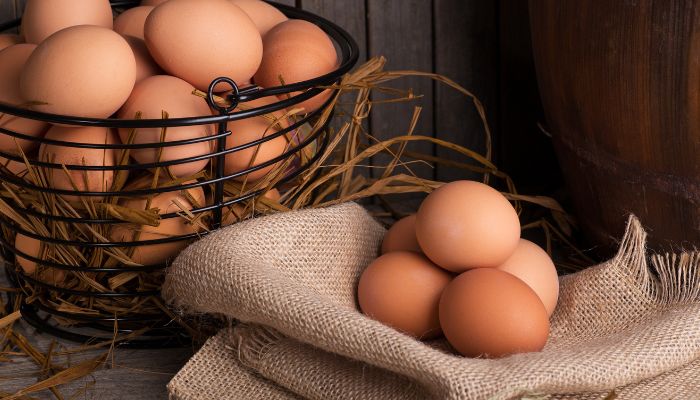
Nutritional Value of Eggs
Eggs are often dubbed as nature’s multivitamin, but are they a good fit for corn snakes?
Breakdown of Nutrients in Eggs
- Proteins: Eggs are rich in proteins, especially the egg white or albumen. Proteins are vital for muscle growth and repair. For snakes, proteins support their growth, skin shedding, and overall health.
- Fats: The yolk is where the majority of the fat resides. These fats are essential for energy, but in excessive amounts, they can lead to obesity in snakes. It’s crucial to note that the fat content in eggs might be higher than what a snake would typically consume in its natural diet of rodents.
- Vitamins: Eggs are a source of various vitamins, including vitamin A, D, E, and K, and a range of B vitamins. These vitamins play roles in vision, bone health, and metabolic processes.
- Minerals: Eggs contain essential minerals like calcium, phosphorus, and selenium. However, the calcium-to-phosphorus ratio in eggs might not be ideal for snakes, especially when compared to whole prey like rodents.
- Cholesterol: The yolk is also high in cholesterol. While cholesterol plays a role in cellular functions, its impact on snakes, when fed eggs regularly, isn’t fully understood.
Eggs offer a broad spectrum of nutrients, but they might not provide the balanced nutrition snakes get from their natural prey. If considering eggs as a food source, they should be given in moderation and not as a primary diet.
How Eggs Compare to the Natural Diet of Corn Snakes in Terms of Nutrition
While eggs offer a plethora of nutrients, they don’t quite match up to the balanced diet corn snakes get from consuming rodents.
Rodents provide them with the right mix of proteins, fats, and other essential nutrients in a form that’s easy for them to digest. Eggs, especially if fed frequently, can lead to nutritional imbalances in corn snakes.
The high-fat content in yolks, for instance, is not ideal for these reptiles.
Types of Eggs: Which Ones Are Safe?
When considering eggs as a potential food source for corn snakes, it’s essential to understand the different types of eggs available and their suitability:
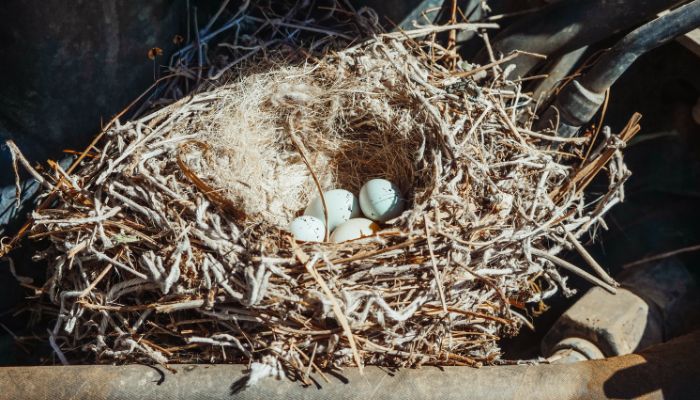
Bantam Hen Eggs vs. Regular Hen Eggs
- Bantam Hen Eggs: These are smaller than the average chicken egg, making them a more manageable size for larger corn snakes. Their shell is thinner, which can be easier for the snake to digest. However, like all bird eggs, they are rich in fats and might not offer a balanced diet on their own.
- Regular Hen Eggs: These are the standard chicken eggs you’d find in a grocery store. Due to their size, they might be too large for most corn snakes. Additionally, the thicker shell can pose digestive challenges.
The Potential of Quail Eggs as an Alternative
- Quail Eggs: These are much smaller than both bantam and regular hen eggs, making them a potential option for corn snakes. Their size is more manageable, and their nutritional profile is somewhat similar to other bird eggs. However, they still contain high levels of fats, so moderation is key.
The Process of Feeding Eggs to Corn Snakes
Feeding eggs to corn snakes isn’t as straightforward as offering them a rodent. Here’s a step-by-step guide to ensure the process is safe and beneficial for the snake:
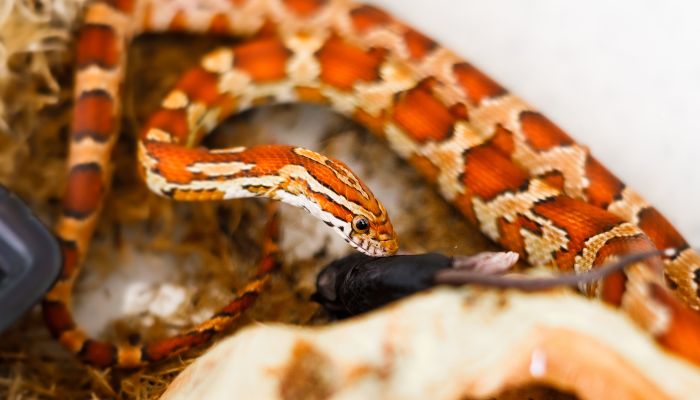
Preparing the Egg: Raw vs. Cooked
- Raw: Offering a raw egg can mimic the natural process of consuming an egg in the wild. However, ensure the egg is fresh to avoid any bacterial contamination.
- Cooked: While cooking can eliminate potential pathogens, it can also alter the nutritional content of the egg. If you choose to cook the egg, avoid using any oils or seasonings. A plain-boiled egg is best.
The Right Size of the Egg for Different Ages and Sizes of Corn Snakes
- Hatchlings and Juveniles: For younger snakes, even a quail egg might be too large. It’s best to stick to their natural diet of insects and small amphibians at this stage.
- Adults: Larger corn snakes might be able to handle bantam or quail eggs. Regular hen eggs are generally too big and can pose a choking hazard.
Monitoring the Snake After Feeding: Signs of a Healthy Meal vs. Potential Issues
- Signs of a Healthy Meal:
- The snake should return to its normal behavior shortly after eating.
- There shouldn’t be any visible discomfort or struggle with digestion.
- Regular bowel movements indicate the egg is being digested properly.
- Potential Issues:
- Regurgitation can occur if the egg is too large or if the snake is stressed.
- A lack of bowel movement or visible discomfort might indicate a digestive issue.
- If the snake becomes lethargic or shows signs of distress, it’s essential to consult with a reptile veterinarian.
While eggs can be an occasional treat for corn snakes, it’s crucial to ensure they are offered safely and in moderation. Always prioritize the snake’s health and well-being when introducing new foods.
Benefits of Feeding Eggs to Corn Snakes
Eggs, with their rich nutrient profile, can offer some benefits when introduced to a corn snake’s diet. Let’s delve into the advantages:
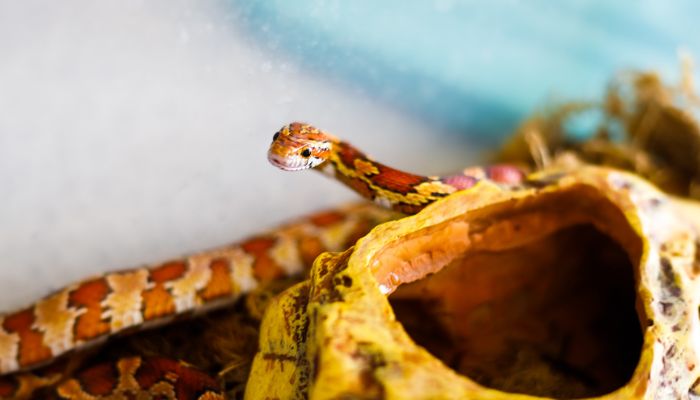
Nutritional Benefits
- Protein Powerhouse: Eggs are packed with proteins, essential for muscle growth and repair in snakes. This protein can support their growth, especially during their younger, more formative years.
- Vitamin and Mineral Boost: Eggs contain a range of vitamins and minerals, including Vitamin A, D, E, and B vitamins, as well as essential minerals like calcium and selenium. These nutrients can support various bodily functions, from vision to bone health.
Potential for Variety in the Diet
- Dietary Diversity: Just as humans enjoy a varied diet, introducing different foods can be beneficial for snakes. Eggs can add a new texture and taste, breaking the monotony of a rodent-only diet.
The Satisfaction and Enrichment it Can Provide to the Snake
- Natural Behaviors: In the wild, corn snakes might occasionally come across bird nests. Offering them an egg can mimic this experience, allowing them to exhibit natural behaviors.
- Mental Stimulation: Introducing new foods can provide mental enrichment, keeping the snake engaged and curious.
Potential Risks and Concerns
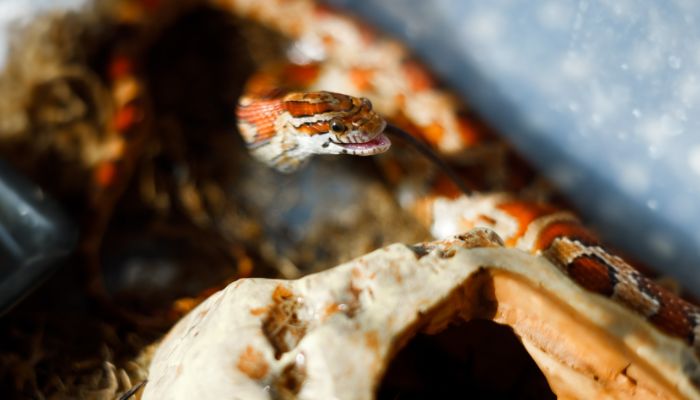
While eggs can offer benefits, they also come with potential risks that every snake owner should be aware of:
Choking Hazards and How to Mitigate Them
- Size Matters: Regular hen eggs can be too large for most corn snakes, posing a choking hazard. Always ensure the egg’s size is appropriate for the snake. Quail or bantam eggs are generally safer due to their smaller size.
- Shell Concerns: The shell, especially if not adequately crushed, can lead to choking. If offering a raw egg, consider cracking it open and offering only the insides.
The Risk of Feeding Contaminated or Spoiled Eggs
- Freshness First: Always ensure the eggs are fresh. Spoiled or rotten eggs can lead to bacterial infections or digestive issues.
- Storage: Store eggs in a cool place and check the expiry date if they are store-bought.
How Often is Too Often? The Risk of Overfeeding
- Moderation is Key: While eggs can be a treat, they shouldn’t replace the primary diet of rodents. Overfeeding can lead to obesity and other health issues.
- Nutritional Imbalance: Relying too heavily on eggs can lead to a nutritional imbalance. The high-fat content, especially in the yolk, is not ideal for regular consumption.
While eggs can be an exciting addition to a corn snake’s diet, they should be introduced with caution. Being aware of the potential risks and ensuring you’re offering eggs safely will ensure your snake remains healthy and happy.
Alternatives to Eggs in a Corn Snake’s Diet
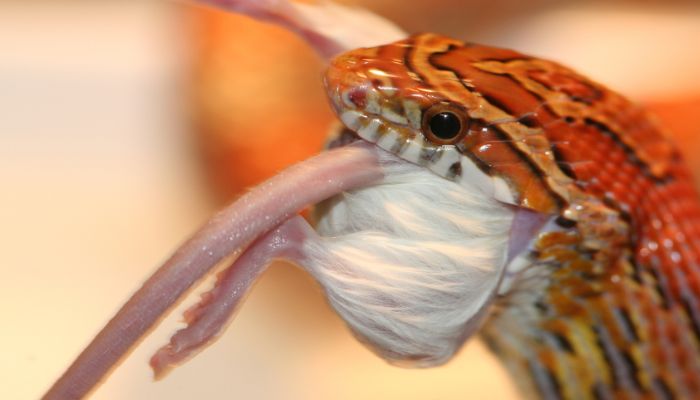
Corn snakes, with their adaptable nature, can thrive on a variety of foods. While eggs might be an occasional treat, there are other nutritious alternatives that can be considered for these slithering beauties:
Other Nutritious Food Options
- Rodents: The primary and most recommended food for corn snakes is rodents, especially mice. They offer a comprehensive nutrient profile, ensuring the snake gets its required proteins, fats, and essential vitamins. Both live and frozen-thawed mice are suitable, depending on the snake’s preference and the owner’s comfort level.
- Insects: Particularly for younger corn snakes, insects can be a beneficial addition. Crickets, earthworms, and even certain beetles can provide essential nutrients. However, they should be given as supplements rather than primary food sources.
- Small Birds: On rare occasions, and especially for larger corn snakes, small birds like finches can be considered. However, this should be an infrequent treat.
The Importance of a Varied Diet for Optimal Health
- Balanced Nutrition: Just like humans, corn snakes benefit from a varied diet. Different foods offer different nutrients, ensuring the snake gets a well-rounded meal.
- Preventing Dietary Monotony: A varied diet not only ensures nutritional balance but also keeps the snake interested in its food. This can be particularly important for snakes that become picky eaters.
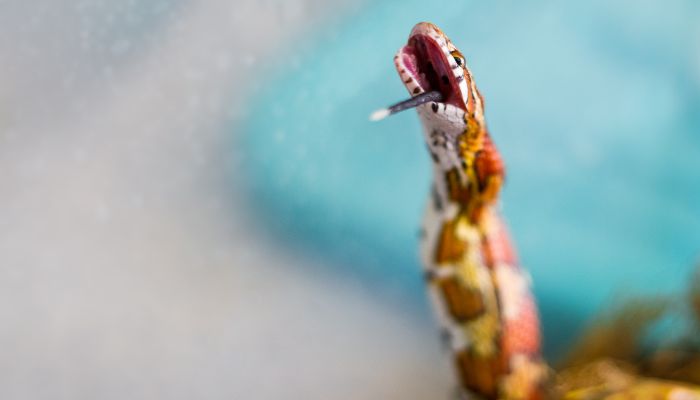
Alright, let’s wrap this up, shall we?
You’ve journeyed through the intricate world of corn snake nutrition, diving deep into the question: can corn snakes eat eggs?
As you’ve discovered, while these captivating reptiles have a diverse diet in the wild, eggs aren’t their go-to meal. Sure, they might occasionally indulge if they stumble upon a bird’s nest, but in captivity, it’s a different story.
The size, nutritional balance, and potential risks associated with eggs make them a treat to be offered with caution.
But here’s the golden nugget: understanding your corn snake’s dietary needs is paramount. By ensuring a balanced diet, you’re setting your slithery friend up for a long, healthy life.
And remember, when in doubt, it’s always best to consult with experts or do further research.
You’re now equipped with the knowledge to make informed decisions about your corn snake’s diet. Keep championing for its well-being, and here’s to many fulfilling years with your fascinating companion.
Your dedication to understanding and caring for your pet truly makes a difference. Well done!
FAQ
Navigating the dietary needs of corn snakes can be a journey filled with questions. Here’s a quick FAQ to address some common queries:
Can corn snakes eat chicken eggs?
While corn snakes can eat chicken eggs, it’s not always the best choice. Chicken eggs, especially those from regular hens, are quite large and can be challenging for a corn snake to consume. If you’re considering giving your snake an egg, smaller options like quail or bantam hen eggs are more appropriate.
Can corn snakes eat raw eggs?
Yes, corn snakes can eat raw eggs. In fact, if you’re offering an egg, it’s best to serve it raw to mimic their natural consumption in the wild. However, always ensure the egg is fresh to avoid potential bacterial contamination.
How do you feed eggs to snakes?
If you’re introducing eggs to your snake’s diet, start by selecting an appropriately-sized egg (like a quail egg for most adult corn snakes). Crack the egg open into a shallow dish, allowing the snake to lap up the contents. This method avoids potential choking hazards associated with the shell.
What kind of eggs do snakes eat?
In the wild, snakes might come across various bird eggs, from sparrows to robins. In captivity, if you’re considering eggs as a dietary supplement, quail eggs are a popular choice due to their size and nutritional profile.
Can snakes eat bad eggs?
Absolutely not. Feeding spoiled or rotten eggs can lead to bacterial infections and severe digestive issues. Always ensure any egg offered is fresh and stored correctly.

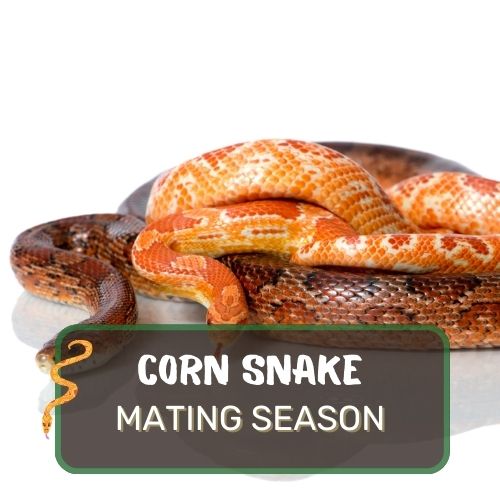
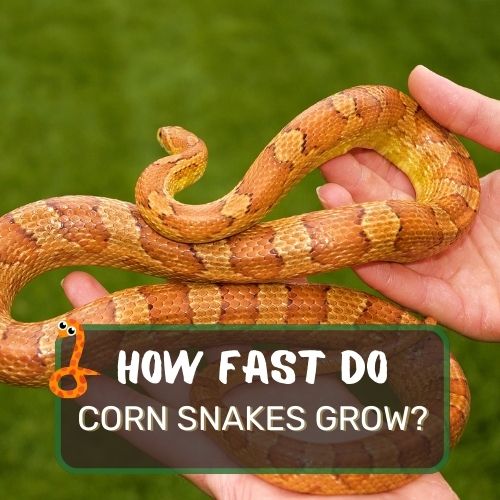
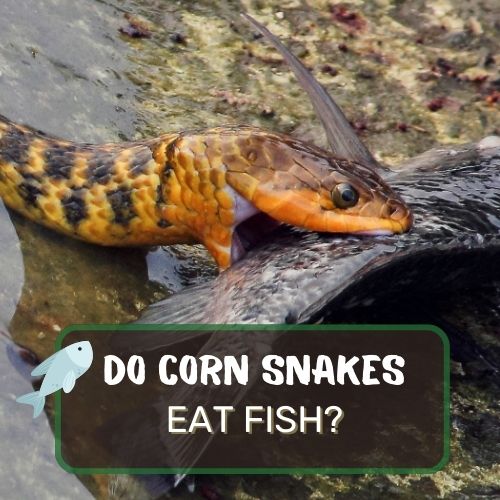
0 Comments